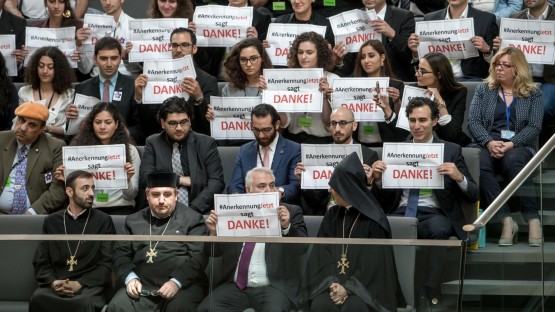This morning, Germany became the thirtieth country to officially recognize the massacre of Armenians at the hands of the Ottomans a century ago as genocide. Although Germany’s recognition comes after several other nations made similar declarations since last April, several factors make the Bundestag’s resolution especially unique: historical ties, the war in Syria and Germany’s own immigrant history all culminate to make today’s news a momentous occasion.

While there is a growing movement in the international community towards declaring the Armenian massacres as genocide, Zack Beauchamp writes in his piece for Vox that Germany’s official recognition of the Armenian Genocide is primarily important for two reasons. First, there is the historical aspect: Germany has already recognized its role in committing atrocities during World War I as an ally of the Ottoman Empire. Several German military advisors played roles in advising Ottoman leaders, including ‘solutions to their Armenian problems.’ Second, it’s widely acknowledged the Armenian Genocide would serve as an inspiration to the Nazis decades later as they attempted to exterminate Germany’s and Europe’s entire Jewish population. Beauchamp writes that official recognition of the Armenian Genocide helps not only the German population heal from its own culpability in atrocities committed against the Armenians, but the later horrors of the Holocaust as well.
Beyond Germany’s historical role in the Armenian Genocide, its recognition today has other importance. As the world’s fourth largest economy, Germany is the wealthiest country to recognize the genocide, surpassing France, which recognized the genocide in 1998. Germany is also a strategically important trading partner of Turkey, generating billions of dollars economic activity between the two countries. The close trade relationship between Turkey and Germany will likely increase pressure on the United States and the Obama Administration to act, as well. Turkish reliance on German trade will likely dull any lasting effect of genocide recognition – something that will likely be of interest to advocates who are continuing to gain recognition in the U.S.
The war in Syria and Iraq is also impacted by today’s declaration from Germany. German Chancellor Angela Merkel was instrumental in getting an agreement passed with Turkey to alleviate the swell of refugees crossing into Europe as a result of the conflict in March. Turkish Prime Minister Binali Yildirim had said prior today’s vote that it would be a ‘test of friendship’ between the two countries. Hours after the resolution passed in Berlin, the Turkish government recalled its ambassador to discuss recent developments. What the future is for the recent refugee agreement remains to be seen.
Today’s news is also noteworthy for how the resolution came forward. German MP Cem Özdemir, a member of the country’s Green Party, authored the resolution last year, hoping it would pass in time to mark the centennial of the genocide in April. Özdemir is of Turkish descent himself – the son of Turkish guest-worker who came to Germany in the 1960’s; he didn’t get German citizenship himself until 1983. Today, Özdemir is one of more than a million Turks living in Germany. His position as the leader of the Green Party in Germany could signal a greater involvement in German politics for Turkish-Germans. In an extra twist, the Bundestag has taken steps to increase voting rights for Turks, adding polling locations for Turks to participate in Turkish elections. Could this ultimately affect Turkish recognition of the Armenian Genocide?
Germany’s official recognition of the Armenian Genocide has been more than a century in the making. While recognizing the genocide is a victory for the victims, survivors and descendants of the genocide itself, the passage of today’s resolution will have an effect well beyond the recognition movement itself.
Joe Eggers is a graduate student at the University of Minnesota, focusing his research on cultural genocide and indigenous communities. His thesis project explores discrepancies between the legal definition and Lemkin’s concept of genocide through analysis of American government assimilation policies towards Native Nations.

Comments 1
Genocide. The Weight of One Word - Center for Holocaust & Genocide Studies — April 27, 2021
[…] five years ago, the Center published two blog articles, Another Genocide Declaration: This One Matters, and Berlin’s Message to Ankara, detailing the importance of Germany’s recognition of the […]